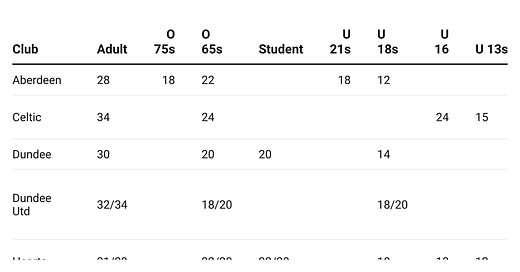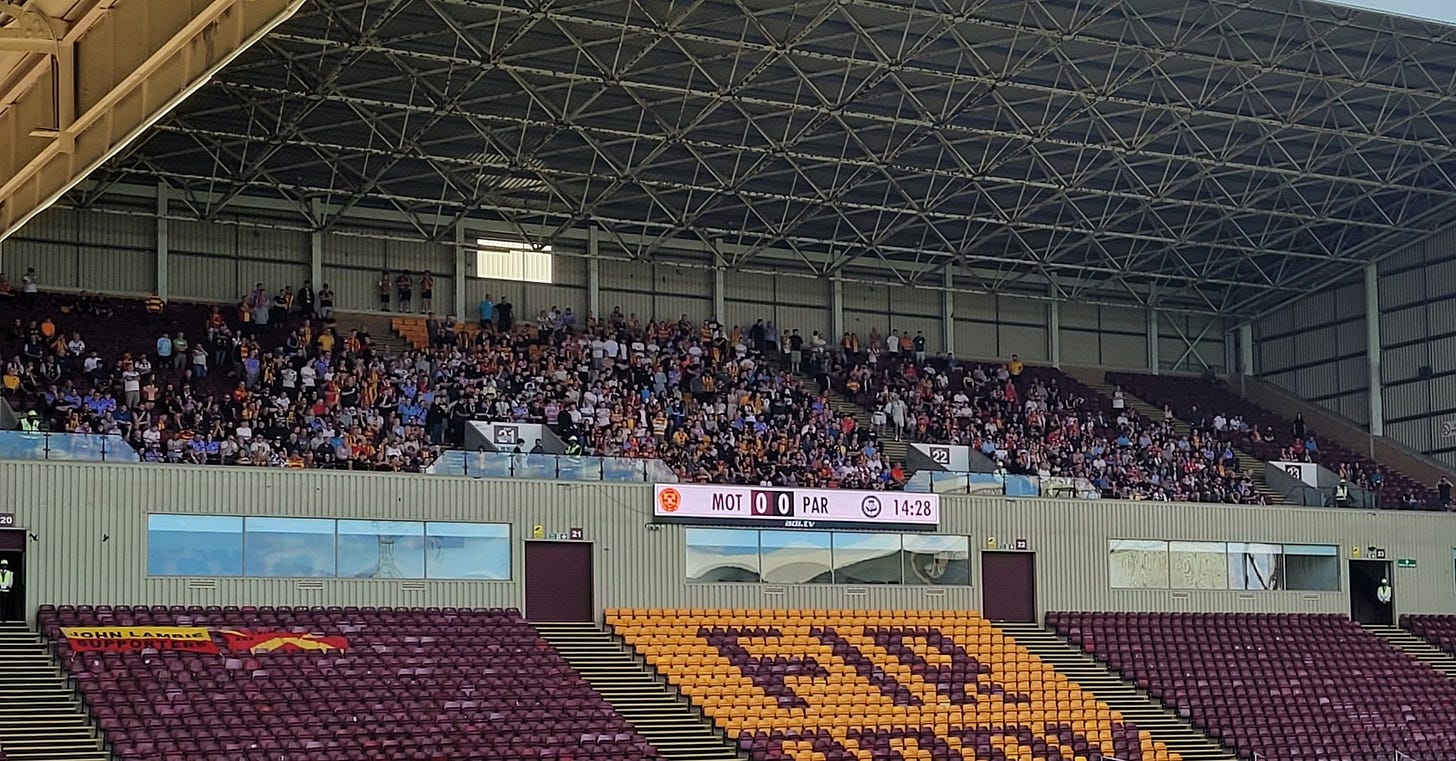Investigation: Are Scottish fans being mugged off with away ticket prices?
Why are Premiership away fans paying more than English matchgoers - and what can you do about it?
When pre-season rolled around, rumours spread of Dundee United charging their city rivals £38 for the opening-day derby.
They turned out to be false as the highest price was £34 - but it sparked a debate about when enough becomes enough.
Some Dark Blues fans threatened a boycott if they were charged £38 and many away fans are now thinking ‘what is my limit?’.
Away games can be magic but rising bills mean most of us must watch every penny.
You could easily spend £1,500 a season on going to every away game with tickets, travel and sometimes hotels.
Then there’s home games and sometimes European away games to consider.
You probably won’t like what I have to say
So, for this post, I wanted to explore the current situation, identify problems and suggest solutions.
A word of warning - you probably won’t like what I have to say, as it involves you breaking old habits and actually doing something, but bear with me.
First, I looked at what clubs are charging away fans this season.
(These prices are based on the home club’s FIRST home game of the season. Prices might change if there is a match-grading system).
Let’s look at the first column.
It shows the cheapest adult away ticket (Hibs) is £9 lower than the dearest (Dundee United).
Over 75s only exist in Aberdeen
Four clubs are charging more than £30. Why is this important? I’ll get to that later.
Then, let’s look at the next two columns dealing with pensioners.
Aberdeen seemingly thought: ‘Maybe over 75s are likely to have less money than younger pensioners.
‘They might also be isolated, and we already do a lot of inclusivity work with walking football and dementia-combatting ‘football memories’ sessions - so let’s help them with £4 off.’
Aberdeen can manage it, why can’t the 11 other clubs?
Likewise, only five clubs have ‘student’ tickets. Do the other seven think those in full-time education have a magic money tree?
Then we move on to the young person/child prices. As you can see, they’re all over the place.
Some clubs allow under 12s in free, while others charge them £15.
Under 18s pay double at Dundee United what they do at Ross County.
Finally, you can see how football clubs treat what they call ‘ambulant’ fans.
Only half of clubs publish prices for disabled fans when they issue ticket information.
The rest have to proactively contact a ticket office to book, rather than just reading the price details on the website so they can plan budgets, like everyone else.
So, what are the issues here?
Adult pricing
A decade ago, in my role as a committee member of the Manchester United Supporters’ Trust, I was involved in the Football Supporters’ Federation campaign for a £30 away-ticket cap in the English Premier League.
This was at a time when some clubs were charging £60 or more.
You might ask - why should home fans pay more to see the same game?
Well, because many of them get a season ticket or membership discount.
They also haven’t paid to travel there, like those in the away end.
Football would be garbage without them
A fair number of home fans are away fans on other weeks so benefit in turn.
And, let’s be honest, home fans secretly love a busy away end.
Football would be absolutely garbage if away fans didn’t bother to show up.
In the end, the FSF’s campaign won because Sky told the clubs ‘away fans make the atmosphere - make their lives easier’.
So the Premier League ringfenced a proportion of the TV deal money to subsidise away ticket prices.
It works like this: Arsenal want to charge £50. They actually charge £30 and the TV deal cash pays Arsenal other £20.
They pay less to see a side worth £970 million more
The cap has been running since 2016 and is still going strong.
It is true that broadcasters would not subsidise Scottish tickets, but Premiership clubs do not have the same financial needs as Premier League clubs, so could take the hit themselves.
I’m left asking - who is pushing for it in Scotland?
When I wrote about contrasting Premiership season-ticket prices recently, some Celtic fans said: ‘Celtic is dearer than Ross County because demand is higher and the football is better, with better players who cost more money.’
Okay, let’s run with that.
Premier League games are 97% sold out. The same cannot be said of Premiership games.
So by rights, Scottish tickets should be cheaper, with the aim of getting more bums on seats.
As for the quality of football - Chelsea fans pay £4 less for away games than those visiting Dundee United - despite their squad costing £970 million more than Dundee United’s.
That’s not an exact comparison, but you get the picture.
There is clearly a case for a cap in Scotland.
Senior citizens
This one is much simpler. Introduce an over 75s category across the board and introduce a £20 cap for over 65s.
Young people
Bring in a discount for those in full-time education, at all 12 grounds.
This could be made much simpler by introducing a flat fee for those not in employment.
It’s a price category that the likes of FC United of Manchester have operated for years without problems.
Children
Make life easier for parents.
Introduce price points for every kids’ category in the table, make prices uniform for all 12 clubs, and publish prices routinely.
Dundee United under 18s paid half as much at Ross County yesterday than Dundee fans paid in the upper tier at Tannadice last week.
How to make things better
So what is the barrier to all this progress?
The problem is age old. Club loyalty.
Scottish fans are in a race to the bottom
Most fans prefer to point score about their clubs’ pricing than unite with rivals and lobby for change.
Rangers fans are so blinded by hatred for Celtic counterparts (and vice versa) that they’d rather both suffer than neither.
Many of them are happy getting no tickets for the Old Firm games - but this attitude just encourages a race to the bottom.
An eye for an eye makes the whole world blind, and all that.
Another issue is apathy. Too many fans just accept the deal they get.
But things only change when fans speak up.
It’s no coincidence that some of the best examples in the tables above (in terms of low ticket prices and lots of price points) are at the clubs who speak to fans best: Hibs, Kilmarnock, Motherwell, Ross County, and St Mirren.
When Hibs played St Mirren last week, St Mirren publicised details of a singing section in the central blocks.
It’s brilliant that St Mirren state in away-ticket information that there will be a singing section in particular blocks, for example.
Things can only improve if you set rivalries aside (for a bit)
So this is where you come in. If you want a £30 cap - and to be treated better at away games, speak up.
Speak to your club’s supporter liaison officer, write to the chairman or the ticket office. Talk to your supporters’ club or trust and to Supporters Direct.
Accept that, in order for your lot to improve, you might have to hold your nose and cooperate with fan groups of other clubs.
I would argue the £30 cap in England would never had had happened had fans of Manchester United and Liverpool worked together.
And look at how quickly the Super League plan imploded after fans put rivalries aside to protest - all on the same page as each other.
It’s not just ticket prices that improve
A pleasant by-product of fans getting up off their arses and campaigning for change is that other things change too.
In England, away fans get 3,000 tickets or 10% of all tickets, whichever is lower (unless local councils intervene).
That means there is true transparency - because the 20 Premier League clubs publish allocations.
So if something is amiss, fans can ask why and work towards ensuring it is when their team next plays at that ground.
It would prevent clubs like Hearts saying ‘we just fancy giving more tickets to our fans to everyone but Hibs can have 650’.
I absolutely guarantee that such a disgraceful idea wouldn’t last two minutes in the Premier League - because the fans of the club proposing would immediately think ‘that could soon be me’.
When Sky subsidised away tickets for the £30 cap, it made Premier League clubs to place away ends near the pitch (with some exceptions).
So you avoid situations like Partick Thistle fans being restricted to the top tier at Motherwell when there are empty seats nearer.
Premier League clubs also have fan engagement officers to talk to fan groups about off-the-field issues (not to be confused with SLOs, whose remit is broader).
Nobody wants Scottish fans to be priced out
These discussions have led to, for example clubs like Manchester United giving free coach travel to fans for evening away games where the fixture date has been changed at short notice and there are no trains back to Manchester after the game.
Manchester United also publish details of how many people applied for tickets for each away game and, for European games, the number of fans who have a certain number of loyalty points so fans can work out their chances of getting tickets.
That all happened due to fan lobbying.
Turning our attentions back north of the border: None of us want a situation where that £34 away-ticket price keeps creeping upwards each season to the point where some fans can no longer afford to go.
But the only way to stop that is to speak out - and work with fans of other clubs towards a common goal.
Thanks for reading. As ever, I’d love to hear your feedback - so please leave a comment, or feel to email dhsubstack@outlook.com






